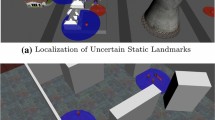Abstract
We consider the problem of target tracking whilst simultaneously preserving the target’s privacy as epitomized by the panda tracking scenario introduced by O’Kane at WAFR’08. The present paper reconsiders his formulation, with its elegant illustration of the utility of ignorance, and the tracking strategy he proposed, along with its completeness. We explore how the capabilities of the robot and panda affect the feasibility of tracking with a privacy stipulation, uncovering intrinsic limits, no matter the strategy employed. This paper begins with a one-dimensional setting and, putting the trivially infeasible problems aside, analyzes the strategy space as a function of problem parameters. We show that it is not possible to actively track the target as well as protect its privacy for every nontrivial pair of tracking and privacy stipulations. Secondly, feasibility is sensitive, in several cases, to the information available to the robot at the start — conditions we call initial I-state dependent cases. Quite naturally in the one-dimensional model, one may quantify sensing power by the number of perceptual (or output) classes available to the robot. The number of initial I-state dependent conditions does not decrease as the robot gains more sensing power and, further, the robot’s power to achieve privacy-preserving tracking is bounded, converging asymptotically with increasing sensing power. Finally, to relate some of the impossibility results in one dimension to their higher-dimensional counterparts, including the planar panda tracking problem studied by O’Kane, we establish a connection between tracking dimensionality and the sensing power of a one-dimensional robot.
Access this chapter
Tax calculation will be finalised at checkout
Purchases are for personal use only
Preview
Unable to display preview. Download preview PDF.
Similar content being viewed by others
References
B. R. Donald, “On information invariants in robotics," Artificial Intelligence–Special Volume on Computational Research on Interaction and Agency, Part 1, vol. 72, no. 1-2, pp. 217-304, 1995.
M. T. Mason, “Kicking the sensing habit," AI Magazine, vol. 14, no. 1, pp. 58-59, 1993.
J. M. O’Kane, “On the value of ignorance: Balancing tracking and privacy using a two-bit sensor," in Proc. Int. Workshop on the Algorithmic Foundations of Robotics (WAFR’08), Guanajuato, Mexico, 2008.
S. M. LaValle, “Sensing and filtering: A fresh perspective based on preimages and information spaces," Foundations and Trends in Robotics, vol. 1, no. 4, pp. 253-372, 2010.
L. Sweeney, “k-anonymity: A model for protecting privacy," Int. Journal on Uncertainty, Fuzziness and Knowledge-based Systems, vol. 10, no. 5, pp. 557-570, 2002.
C. Dwork, “Differential privacy: A survey of results," in Proc. Int. Conference on Theory and Applications of Models of Computation. Springer, 2008, pp. 1-19.
I. Clarke, O. Sandberg, B. Wiley, and T. W. Hong, “Freenet: A distributed anonymous information storage and retrieval system," in Int. Workshop on Designing Privacy Enhancing Technologies: Design Issues in Anonymity and Unobservability, 2001, pp. 46-66.
P. Kamat, Y. Zhang, W. Trappe, and C. Ozturk, “Enhancing source-location privacy in sensor network routing," in Proc. IEEE Int. Conference on Distributed Computing Systems (ICDCS’05), Columbus, Ohio, USA, 2005, pp. 599-608.
P. Kamat,W. Xu,W. Trappe, and Y. Zhang, “Temporal privacy in wireless sensor networks," in Proc. Int. Conference on Distributed Computing Systems (ICDCS’07), Toronto, Ontario, Canada, 2007, pp. 23-23.
J. O’Kane and D. Shell, “Automatic design of discreet discrete filters," in Proc. IEEE Int. Conference on Robotics and Automation (ICRA), Seattle, WA, USA, 2015, pp. 353-360.
Y.-C. Wu and S. Lafortune, “Synthesis of insertion functions for enforcement of opacity security properties," Automatica, vol. 50, no. 5, pp. 1336-1348, 2014.
Y.-C. Wu, V. Raman, S. Lafortune, and S. A. Seshia, “Obfuscator synthesis for privacy and utility," in NASA Formal Methods Symposium. Springer, 2016, pp. 133-149.
A. Prorok and V. Kumar, “A macroscopic privacy model for heterogeneous robot swarms," in Proc. Int. Conference on Swarm Intelligence (ICSI). Springer, 2016, pp. 15-27.
D. Bhadauria, V. Isler, A. Studenski, and P. Tokekar, “A robotic sensor network for monitoring carp in minnesota lakes," in Proc. IEEE Int. Conference on Robotics and Automation (ICRA), Anchorage, AK, USA, 2010, pp. 3837-3842.
F. Fang, P. Stone, and M. Tambe, “When security games go green: Designing defender strategies to prevent poaching and illegal fishing," in Proc. Int. Joint Conference on Artificial Intelligence (IJCAI), Buenos Aires, Argentina, 2015.
Author information
Authors and Affiliations
Corresponding author
Editor information
Editors and Affiliations
Rights and permissions
Copyright information
© 2020 Springer Nature Switzerland AG
About this chapter
Cite this chapter
Zhang, Y., Shell, D.A. (2020). You Can’t Save all the Pandas: Impossibility Results for Privacy-Preserving Tracking. In: Goldberg, K., Abbeel, P., Bekris, K., Miller, L. (eds) Algorithmic Foundations of Robotics XII. Springer Proceedings in Advanced Robotics, vol 13. Springer, Cham. https://doi.org/10.1007/978-3-030-43089-4_12
Download citation
DOI: https://doi.org/10.1007/978-3-030-43089-4_12
Published:
Publisher Name: Springer, Cham
Print ISBN: 978-3-030-43088-7
Online ISBN: 978-3-030-43089-4
eBook Packages: Intelligent Technologies and RoboticsIntelligent Technologies and Robotics (R0)




